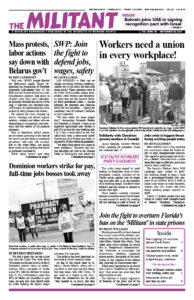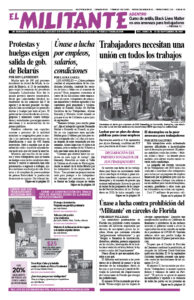MANCHESTER, England — “Yes, I took part in the protest,” Shahid Munawar, who has driven a cab here for 16 years, told members of the Communist League introducing the party and the Militant to those at the taxi line outside Victoria train station. “We stopped the traffic on Oxford Street and then drove around in circles beeping our horns, making noise.”
Hundreds of cabbies, mostly regular black-cab drivers but also some from private-hire service, protested Aug. 26 against plans by the Greater Manchester Combined Authority for a so-called Clean Air Zone. This would mean that by 2023 taxi drivers wanting to work in the city center would have to drive electric cabs or pay a daily charge.
In July the Greater Manchester Combined Authority issued a statement quoting Andy Burnham, the Labour Party mayor, saying this is an “opportunity to build back cleaner, greener and better in Greater Manchester following the coronavirus pandemic.”
“We’ve got cabs here from across the entire region,” Karl Warburton, spokesman for the Greater Manchester Taxi Trade Coalition, told the media. “At a time of crisis as it is with the pandemic, it’s just completely unaffordable, and we will see the trade decimated right across the entire Greater Manchester region.” The group is calling for a 30% to 40% subsidy to help drivers with cost of the changes.
“This won’t affect me,” said Billy Jones, who plans to retire in a few months. “But it is impossible for young people to get into the trade. You need to spend over 70k pounds [$90,000] on an electric. I’d be lucky to get 15 or 20 for this one.”
More local councils around England are moving to implement these types of “green” taxes. Last year cab drivers in Birmingham staged a number of protests demanding more subsidy from the council to help them comply with new government-imposed standards.
Everyone we spoke with said the government lockdown in response to the COVID-19 pandemic had devastated them financially. Although rides are picking up a bit, there are still far fewer people going to work in city center offices. Large events like concerts, where cab drivers would normally make a substantial proportion of their income, are still banned.
“It was a good action,” said Farooq Azam about the Manchester protest. “I can’t pay the charge and I can’t afford an electric,” he told the Communist League members. “After 30 years as a cab driver, what else will I do?”
“Working people everywhere are facing a devastating jobs crisis. Workers need a union movement in every workplace,” Hugo Wils, a meat-plant worker and member of the Communist League, replied. “We must fight for a government-funded public works program to put millions to work building the things we need. And demand the bosses cut the workweek with no cut in pay to stop layoffs.”
“The Clean Air Zone plans are another way the capitalist rulers, and their government and council leaders, try to make working people pay for their crisis,” Wils said. “Workers and our unions must fight for workers control over production to protect the lives and limbs of workers, as well as the environment.”

